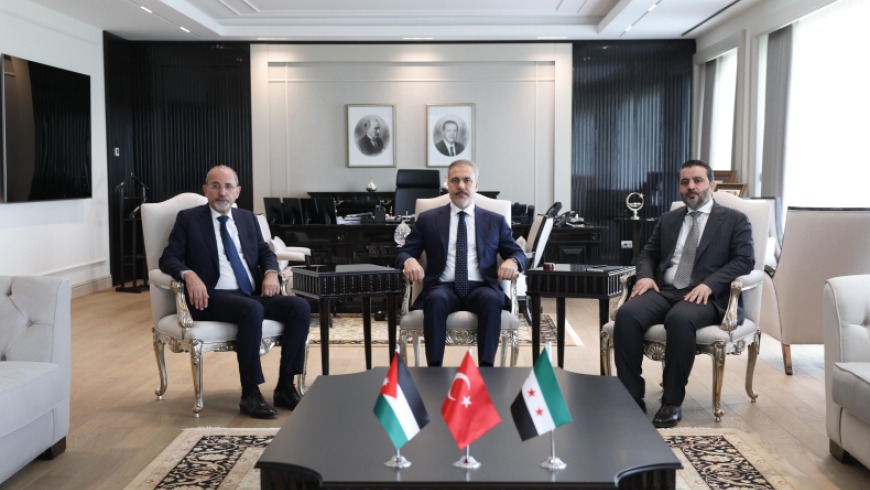Ankara hosted a high-level trilateral meeting today between the foreign ministers of Syria, Turkey, and Jordan, culminating in a joint press conference that emphasized regional cooperation, border security, and post-conflict recovery in Syria. The talks, described by all three parties as “constructive and fruitful,” mark a potential turning point in Syria’s re-emergence as a regional actor after years of civil war and isolation.
Shibani: Stability Hinges on Sovereignty and Cooperation
Syrian Foreign Minister Asaad Shibani opened the session by thanking Turkey for hosting and praising Jordan’s constructive participation. He commended the recent agreement between Ankara and the Kurdistan Workers’ Party (PKK), calling it “a watershed moment not only for Turkey’s domestic security but also for the stability of our shared region.”
He reiterated Damascus’s vision for the next phase: a sovereign, united Syria free from foreign interference. “Restoring stability and ending cycles of violence require genuine regional coordination,” Shibani said, warning that “militias backed by external actors remain a serious threat to peace.”
Joint Security Framework and Terrorism Threats
The meeting focused heavily on transnational security threats. Shibani underlined the necessity of enhanced intelligence coordination to monitor militant activity, prevent cross-border infiltration, and disrupt the operations of armed groups. “Security is no longer a national affair—it’s the bedrock of regional trust, reconciliation, and reconstruction,” he said.
Both Turkish Foreign Minister Hakan Fidan and Jordanian Foreign Minister Ayman Safadi echoed these concerns. Fidan stressed that combating ISIS and other extremist factions remains a top priority. Safadi noted that “terrorism is a threat not just to Syria but to the region as a whole.”
Condemnation of Israeli Airstrikes and Assertion of Sovereignty
A substantial portion of the press conference addressed Israeli military actions in Syria. Shibani described the ongoing airstrikes as “systematic violations of international law” and provocations designed to destabilize the region. “These are not acts of self-defense,” he argued, “but deliberate escalations targeting civilian infrastructure.”
He called on the international community to enforce accountability and uphold the 1974 Disengagement Agreement on the Golan Heights. “Syria’s territorial integrity is non-negotiable. We are one, indivisible nation, sovereign over all our land.”
His stance was strongly backed by Jordan, whose foreign minister described Israeli attacks as “renewed aggression and blatant interference in Syrian affairs.” Safadi added: “These strikes will not bring security to Israel, nor peace to Syria—only destruction.” He emphasized Jordan’s strategic concern over southern Syria, which borders Jordan directly.
Reconciliation with the Syrian Democratic Forces (SDF)
Turning to internal affairs, Shibani confirmed that Syria is actively implementing an agreement with the Kurdish-led Syrian Democratic Forces to reintegrate northeastern regions under central government authority. “The process is delicate but vital,” he said, assuring that Kurdish rights would be protected and warning that delays could invite further instability and foreign meddling.
He emphasized that the current Syrian government, in place since December 2024, is committed to resolving disputes through dialogue. “Our goal is unification, not domination,” he said, appealing to all Syrians to participate in rebuilding the state.
Turkish officials noted that one-third of Syria remains under SDF control and discussed possible steps to end the group’s autonomy, signaling cautious support for Damascus’s integration efforts.
Toward a Political Transition and Economic Revival
Shibani announced Syria’s intention to form a new national parliament reflective of the country’s diverse population—a key step toward legitimizing post-Assad governance. “This marks a decisive step in restoring representative authority,” he said, calling on Syrians from all regions and backgrounds to take part.
Diplomatically, he revealed plans to reopen the Syrian Embassy in Ankara and a consulate in Gaziantep, alongside the existing mission in Istanbul. Syria and Turkey are also coordinating to ease administrative and civil burdens on Syrian residents in Turkey.
Economically, both nations are finalizing agreements in energy and transportation aimed at revitalizing regional infrastructure and commerce. “Economic stability is the foundation for peace,” Shibani stated, announcing a forthcoming Syrian-Jordanian government summit in Damascus to advance bilateral cooperation.
Call to End Sanctions and Enable Refugee Return
Shibani also addressed the enduring impact of Western sanctions, arguing they obstruct reconstruction and prevent displaced Syrians from returning home. “Thousands of Syrian professionals are ready to rebuild, but the sanctions have become punitive measures against the people, not the past regime,” he said.
He urged the European Union and the United States to reconsider their positions, noting that initial dialogues with Brussels have begun. Turkish and Jordanian officials also voiced support for lifting sanctions to facilitate economic recovery and refugee repatriation.
Unified Vision Against Extremism and for a Sovereign Syria
In his closing remarks, Shibani affirmed Syria’s commitment to eradicating terrorism and maintaining national unity. “We reject division, foreign domination, and despair. With the support of our neighbours and through collective action, we can build a new Middle East rooted in dignity, sovereignty, and sustainable peace.”
This message resonated with both Turkish and Jordanian envoys, who reaffirmed their support for a stable, united Syria. “Every Syrian deserves full rights under a sovereign state,” Safadi said. “This is a vision we fully endorse.”
This article was translated and edited by The Syrian Observer. The Syrian Observer has not verified the content of this story. Responsibility for the information and views set out in this article lies entirely with the author.


